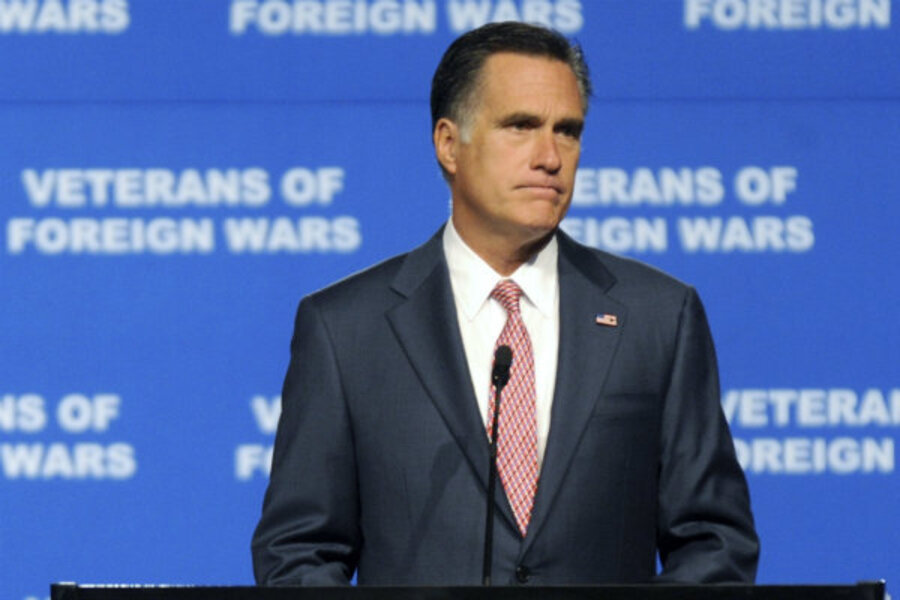Romney and Obama on foreign policy: short on specifics
Loading...
| Beals Island, Maine
Down through the years, foreign policy has usually been given short shrift in US presidential election campaigns. Domestic issues generally dominate, and it looks as though the US economy and unemployment will get most of the attention this year.
President Obama and Mitt Romney delivered foreign policy speeches to the Veterans of Foreign Wars this week, but neither offered great detail on how they will deal with a fractious world. Mr. Obama delivered a fiery speech on promises he has made and kept to veterans, who certainly are deserving of honor and post-war care. Mr. Romney attacked the White House for leaks of national security secrets and for pending defense cuts, which will kick-in automatically at the end of the year.
Romney is now on a foreign trip to Britain, Israel, and Poland. He has a longstanding friendship with Israel’s Prime Minister Netanyahu, with whom Obama has sometimes been at odds. The Israeli visit will redound well with the politically influential Jewish community in the US.
Thus we may be in for a brief period of relief from a campaign that is costing too much money, taking too long, and been sadly short of civility. It is a long tradition that tawdry domestic policy sniping is put on hold when a president or presidential candidate is abroad. Hopefully both presidential candidates will observe this.
Romney does not have vast experience in the making and practice of foreign affairs. He lived in France for two years as a Mormon missionary, has traveled throughout the world, and ably handled athletes, their handlers, and visiting dignitaries, from scores of foreign countries when he piloted the 2002 Winter Olympics in Salt Lake City out of scandal and pending financial disaster to great success.
His foreign policy advisers in the presidential campaign include such luminaries as Henry Kissinger and George Shultz. In Joe Biden, Obama has a vice-president well versed in foreign policy. If Romney selected former Secretary of State Condoleeza Rice as his vice-presidential running mate he would have not only an African-American woman on his ticket, but a skilled foreign policy adviser.
However, that prospect seems to have faded, and so Romney’s choices for such key foreign policy roles as secretary of state and secretary of defense would be particularly critical should he win the presidency.
Obama was similarly not a foreign policy expert when he first ran for the presidency and was taunted in the campaign for his inexperience by his then rival Hillary Rodham Clinton. When he won the White House he co-opted her for secretary of state, where she has served as a loyal and energetic adviser to him on foreign policy. She has vowed not to serve in a second Obama term, opening the post to such eager candidates as Senator John Kerry of Massachusetts if Obama is re-elected.
As a new president, Obama set some ambitious foreign policy goals: changing America’s image in the Islamic world, resetting the relationship with Russia, opening a dialogue with Iran, closing Guantanamo, and so on. These have faded into oblivion as new issues have come to dominate: the Arab spring, destabilization of Iraq, a tougher and often uncooperative Putin regime in Russia, China’s expansionist ambitions, Iran’s accelerating nuclear ambitions, a war-weary acceleration of US departure from Afghanistan.
Obama’s spectacular triumph in the foreign field has been the successful neutralization of Osama bin Laden, which Americans have roundly applauded. His most dramatic change in foreign policy has been an assessment that US power is limited and ideally should be used in tandem with other cooperative nations. This reticence to use American power unilaterally has led his critics to condemn “leadership from behind,” for example, in bringing regime change to Libya, and outright lack of leadership, for example, in confronting murderous behavior by the ruling regime in Syria.
Though Romney has hardly been forthcoming with details of his foreign policy plans, he has sounded much firmer about American leadership in the world, and more strident, for example, about the American role in curbing Iran’s nuclear weapons program. He has been more robust than Obama in confronting unfair Chinese trade practices and theft of intellectual property rights.
But as Obama has learned in his first term, declarations of intent in foreign policy are hostage to unpredicted changes, upheavals, and explosions in far-off lands sometimes immune to US hopes, wishes, and persuasion.
John Hughes, a former editor of the Monitor, served in the Reagan administration as assistant secretary of State and State Department spokesman.







